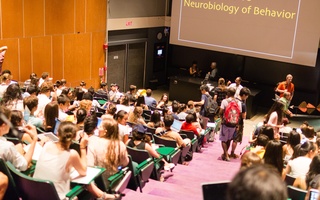According to Secretary of the Administrative Board, John “Jay” L. Ellison, a representative from UHS compiles the information gathered from the letters and the interview and makes a recommendation to the Ad Board. After reviewing this information, the body votes on whether the student is fit to return to college life.
When George, who took time off for mental health reasons in fall 2012, flew to Cambridge last July for his UHS interview, his interviewer all but assured him that he would be readmitted, saying that only a handful of people that she interviewed were eventually rejected by the Ad Board.
“It wasn’t a very long interview; it was only ten, 15 minutes long,” said George, whose name has been changed given the sensitive nature of this topic. “I know it was necessary, and I’m sure she got useful information from it, but it felt a little bit like a formality more than anything else.”
Kate, who was placed on leave for mental health reasons, said the financial cost of travelling to Cambridge for an in-person interview can be burdensome for some students. “If I were an international student or a student from California, I just couldn’t imagine it,” said Kate, whose name has also been changed.
But after a long process of collecting letters of recommendation and communicating with UHS, most students who take time off for mental health reasons return to campus, bringing with them not only their bags and possessions but also a new perspective on college life.
HARVARD, TAKE TWO
When Partovi returned to campus after her leave of absence, she came back to the same routine she left nearly a year earlier—the same Opening Days, the same Community Conversations, and the same freshman year. Yet she arrived as a different person, with a different approach to living the life of a Harvard student, and even a different name.
Instead of her first name, Karina, Partovi began introducing herself outside of the classroom as Todd, the name that her mother had often used when she was a child.
“I didn’t want to be the person I was before,” Partovi said. “I was very ashamed of myself—I felt like there was a black cloud over my head.”
Students like Partovi say that taking time away from campus helped them gain perspective and better take on their Harvard experience, reinventing their priorities as college students.
“I think I grew up a lot and coming back I could handle Harvard a lot more,” said Ella, whose name has also been changed. “I know why I’m here, and I know what I want to get out of Harvard so it makes things a lot simpler and less overwhelming.”
Kate said that the process of taking a leave of absence and paying for her own therapy changed the way she approaches the challenges of life as a Harvard student.
“I would say that apathy is generally a bad trait for a student, but I think for a lot of Harvard students, it can be a good trait,” Kate said. “Now if I have a midterm, I’m substantially less stressed because having to study for a midterm is not the same stress as having to find out how to pay for treatment.”
Ella, who also took time off for mental health reasons, was unsatisfied with her concentration choice and had struggled to select appealing classes when she left Harvard in the middle of her sophomore year. But when she came back to Cambridge after her leave of absence, she was already determined to switch her concentration and was looking forward to her new academic path.
“I was really happy to be taking classes...and I actually enjoyed them,” Ella said of the first semester she was back from her leave. “I was doing what I really wanted to do.”
Read more in College News
Getting BetterRecommended Articles
-
A Different Ed ExFounded in 1910, the Harvard Extension School offers classes to nearly 13,000 students living in and around Boston. The school attracts a diverse class, bringing together recent high school graduates and 40-year-olds all in the same classrooms.
-
 The Pudding's "Secret ": A Success
The Pudding's "Secret ": A Success -
Freshman Men's Lightweight Crew Coach Linda Muri Moves to DartmouthAfter guiding the lightweight four to a silver medal at the 2014 IRA National Championship, lightweights coach Linda Muri has decided to take the helm of women’s rowing at Dartmouth University.
-
 First Day Sees Crowded Classes, Imprecise Pre-Term Planning
First Day Sees Crowded Classes, Imprecise Pre-Term Planning -
Out of the Army, Back to SchoolIsraelis are not the only students at Harvard who have to factor in mandatory service to their education and career plans. Fifteen Minutes also spoke to students from South Korea—who typically take time off in the middle of college in order to complete their mandatory two years—and from Singapore about their transitions between service and scholarship.













